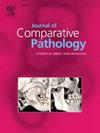Disseminated protothecosis caused by Prototheca bovis in two dogs
IF 0.8
4区 农林科学
Q4 PATHOLOGY
引用次数: 0
Abstract
Protothecosis is an infectious disease caused by unicellular algae of the genus Prototheca, which are mainly known for causing mastitis in farm animals. However, there are reports of protothecosis in humans and other animals, such as dogs and cats, which develop cutaneous lesions or systemic lesions. Dogs with the systemic form generally develop bloody diarrhoea and blindness and neurological signs may also occur. The condition generally leads to the animal being euthanized due to the unfavourable prognosis. The objective of this work was to report two cases of disseminated protothecosis, one in a Pekingese dog (case 1) and the other in a German Shepherd Dog (case 2). Both animals had a history of chronic diarrhoea with haematochezia, which was unresponsive to various treatments in case 2. Both dogs were euthanized due to their clinical condition and were sent to the Veterinary Pathology Laboratory of the Federal University of Paraná for post-mortem examination. Macroscopically, the lesions in both cases were similar and were characterized by multifocal millimetre-sized white nodulations in the heart, skeletal muscles and intestinal serosa, as well as signs of fibrinonecrotic enterocolitis and lymphoplasmacytic interstitial nephritis. In both cases there was also retinal displacement with lymphoplasmacytic uveitis and chorioretinitis. The cytological and histopathological evaluation of the tissues revealed the presence of structures compatible with Prototheca spp. Polymerase chain reaction identified Prototheca bovis in both cases. This is a rarely reported disease and must be considered as a differential diagnosis in cases of chronic diarrhoea with haematochezia that progress to blindness in dogs.

2只犬由牛原鞘菌引起的播散性原鞘病。
原苔病是由原苔属的单细胞藻类引起的传染病,主要以引起农场动物的乳腺炎而闻名。然而,在人类和其他动物(如狗和猫)中也有原生苔藓病的报道,其发展为皮肤病变或全身病变。患有全身性形式的狗通常会出现血性腹泻和失明,也可能出现神经系统症状。这种情况通常会导致动物因预后不良而被安乐死。本研究的目的是报告两例弥散性原鞘病,一例发生在北京哈巴狗(病例1),另一例发生在德国牧羊犬(病例2)。两例动物均有慢性腹泻伴血衣病病史,病例2对各种治疗均无反应。由于它们的临床状况,两只狗都被安乐死,并被送往帕拉南联邦大学兽医病理学实验室进行尸检。从宏观上看,两例的病变相似,均表现为心脏、骨骼肌和肠浆膜的多灶性毫米大小的白色结节,以及纤维蛋白坏死性小肠结肠炎和淋巴浆细胞间质性肾炎的征象。这两例患者均有视网膜移位伴淋巴浆细胞性葡萄膜炎和绒毛膜视网膜炎。组织的细胞学和组织病理学评估显示存在与原鞘属相容的结构,聚合酶链反应在这两种情况下都鉴定出了牛原鞘。这是一种很少报道的疾病,在狗的慢性腹泻伴血衣病发展为失明的病例中,必须将其视为鉴别诊断。
本文章由计算机程序翻译,如有差异,请以英文原文为准。
求助全文
约1分钟内获得全文
求助全文
来源期刊
CiteScore
1.60
自引率
0.00%
发文量
208
审稿时长
50 days
期刊介绍:
The Journal of Comparative Pathology is an International, English language, peer-reviewed journal which publishes full length articles, short papers and review articles of high scientific quality on all aspects of the pathology of the diseases of domesticated and other vertebrate animals.
Articles on human diseases are also included if they present features of special interest when viewed against the general background of vertebrate pathology.

 求助内容:
求助内容: 应助结果提醒方式:
应助结果提醒方式:


